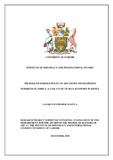| dc.description.abstract | In an undeniably incorporated world, nations have turned out to be reliant upon each other and therefore the activities of one nation influence others. Many nations have embarked on creating partnerships that are aimed to protect and enhance their interests in the international system and therefore cushion their citizens against unfavorable circumstances. Towards this end, African countries have formulated joint long-term development goals called the African Union (AU) Agenda 2063, through which they seek to utilize their resources in a sustainable way to improve the living conditions of their people and protect themselves against hostile environments while leveraging on global partnerships to enhance their growth and development. The objective of this study was to examine the role of foreign policy in advancing development interests in the continent of Africa, using the case of Blue economy in Kenya. This study intends to make a scholarly contribution on the role of the Blue economy in promoting foreign policy interests in Africa, which aims to strengthen economic and security sectors and hopefully enhance academic knowledge in the Blue economy and foreign policy issues. Functionalism theory was applied to examine the role of foreign policy in advancing development interest in Africa using a case study of Blue economy in Kenya. The study adopted exploratory research design where Primary data was collected using key informants, questionnaires and interview methods while Secondary data was collected through books, journal articles and periodicals. The study mainly focused on the whole of Kenya. The main target populations for this study included Ministry of Trade, Ministry of Foreign Affairs, Kenya Defence Forces, Kenya Ports Authority, Kenya Maritime Authority, Fisheries Department, and other government agencies. Document analysis method was eventually used to draw conclusions. The final results were presented in form of graphs, pie charts, narratives and tables to allow a reader to understand and correctly interpret circumstances affecting the Blue economy. The study found that in the Kenyan context, the main sectors of the Blue Economy are traditional activities such as fisheries, aquaculture, tourism, transport, and ports, as well as emerging sectors such as renewable energy and deep sea mining. This study therefore establishes that although the dominant activities of Blue Economy in Kenya remain focused on trade, energy and fishing, foreign policy remains a fundamental aspect that require to be addressed if Blue Economy has to thrive. The study reveals that the maritime security challenges in Kenya’s maritime domain are complex and therefore require multinational collaboration to address them, and several states are currently assisting the maritime security agents of IOR countries. The study also revealed that 99% of the participants were of the view that there was need for interagency collaboration in handling security threats in Kenya. This study concludes that Blue economy challenges and opportunities can only be addressed by means of a comprehensive foreign policy that involves political, military and societal measures, and strengthens regional security capabilities. This study also concludes that the Blue economy is still a new concept in Kenya and therefore did not feature prominently in the current foreign policy document of Kenya that was adopted in 2014. The study therefore recommends that the Kenyan Government should enhance maritime capacity through deliberate and specialized training and step-up maritime diplomacy capacity building among the maritime states by promoting partnerships that strengthen bonds between allies. | en_US |



